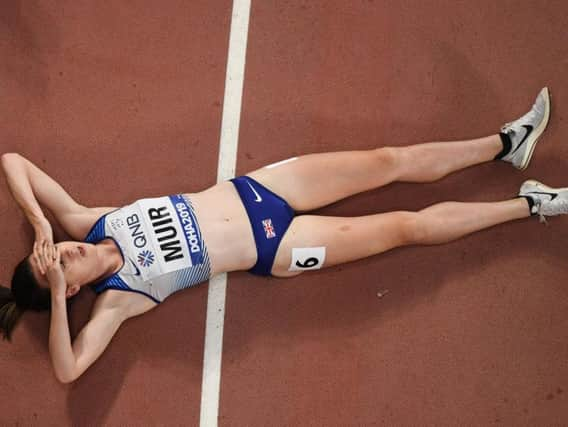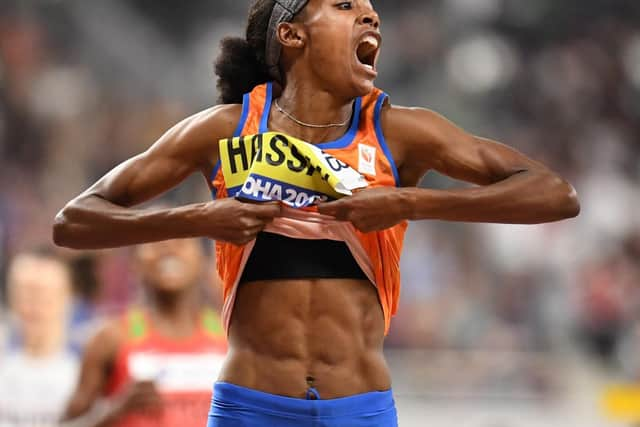Cloud hangs over Alberto Salazar-trained Sifan Hassan's 1500m win says Laura Muir


No-one before at a world championships has ever done the 1,500 and 10,000 metres double but Sifan Hassan of the Netherlands managed it with seemingly effortless ease.
Her margin of victory in the shorter distance on Saturday night was something to behold. Laura Muir, hoping that the cards might fall her way, was stranded in fifth, the wealth of preparatory time lost to a calf injury just too much to overcome.
Advertisement
Hide AdAdvertisement
Hide AdThe deck, suggested the Scot, felt stacked against her from the outset. Hassan emerged from the haven she had built, away from intense scrutiny once word emerged a few days earlier of the four-year ban imposed upon her coach Alberto Salazar for a litany of doping offences during his tenure in charge of the Nike-sponsored Oregon Project.


Hassan has declared herself ignorant and blameless. Not guilty by association. “I am clean and I’m showing everyone how clean I am,” the Dutchwoman seethed. Muir, and others, arrived with a scepticism that will not quickly disappear. “Given the news of the past couple of days, I think there is a cloud,” the Scot said of the result. “There’s no avoiding that. But all you can do is focus on your performances.”
That she managed, despite revealing a stomach bug that had lengthened her odds of a remarkable recovery still further. The 26-year-old Scot gamely gave chase, even when Hassan accelerated clear as the bell tolled, onward to set a championship record of 3:51.95 and adding 1,500m gold to the 10,000m title she won earlier at the championships.
Next to pass Muir was the Olympic champion Faith Kipyegon, towards silver, while Ethiopia’s Gudaf Tsegay pulled away for bronze.
Muir the European champion, delivered her speediest time of 2019 – 3:55.76. Ciara Mageean, in tenth, lowered the Northern Irish record. It was a case of ifs and buts and maybes for Muir, even if it offers optimism heading into an Olympic campaign.
“It felt fast and I didn’t want to go with that, I don’t know what they went through the first 400m in, but I knew running that sort of pace people would die off a bit,” Muir said. “I knew I had to be in contention at the bell, I didn’t quite realise how fast it was. That race was something else. I was really competitive, I was in all the right places but I was missing that gear or two.”
Entering the final day of the world championships, the British medal tally stands at five, following silvers in both the men’s and women’s 4x100 relays. Dina Asher-Smith became the first UK athlete to make the podium three times at a single worlds when the 200m champion linked up with Asha Philip, Ashleigh Nelson and Daryll Neita to clock 41.85secs to help Britain to women’s relay silver. Jamaica took gold.
It followed the withdrawal of Imani-Lara Lansiquot, just moments before the start. “We have the experience to switch people around,” Asher-Smith underlined. “And it was almost a personal best with no practice in warm-up areas.”
Advertisement
Hide AdAdvertisement
Hide AdGB&NI’s men could not prevent the USA from seizing away the 4x100 title they claimed so brilliantly in London two years ago. The Americans’ time of 37.10secs was the third fastest ever, leaving Adam Gemili, Zharnel Hughes, Richard Kilty and Nethaneel Mitchell-Blakestranded in second despite a European record of 37.36.
Eilish McColgan came tenth in the 5,000 metres with an ache of disappointment. The 28-year-old Dundonian gambled on taking an early lead but it could not last. The efforts spurred her to a time of 14:46.17, lowering her Scottish record. But it was too far off the pace as Kenyan’s Hellen Obiri defended her title in a championship record of 14:26.72.
“All year I’ve had Jo Pavey’s time of 14:39 in mind and I knew from training that I’ve been in good shape,” McColgan said. “It’s not easy going out and setting the pace for everyone. I knew I wanted a quick race but in order to do that, and get a personal best, I was going to have to take it on.”
The British men’s 4x400m team of Cameron Chambers, Rabah Yousif, Martyn Rooney and Lee Thompson scraped into the final after Botswana were disqualified. The women got through in second place in their semi, with Aberdeen’s Zoey Clark now targeting a fifth major medal in three years. “We can definitely step up our game,” she said ahead of Sunday's finals.